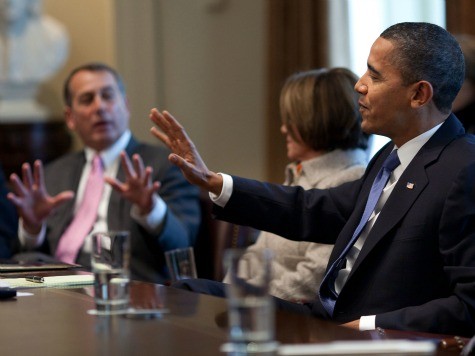
In today’s chapter of “The Fiscal Cliff,” Senate Leaders Reid and McConnell are working behind the scenes to craft a deal to meet Monday’s midnight deadline. Yesterday, President Obama met with congressional leaders, for the first time in six weeks, and urged the Senate to reach a deal over the weekend. If they failed to reach a deal, Obama warned, he would press them to put his original proposal before the Congress for an up or down vote.
Obama’s original offer called for around $1.6 Trillion in new taxes, directed most of the new revenue to new spending, and trimmed the deficit by a paltry $400 Billion over 10 years. That’s roughly, at most, a 1% cut in projected federal spending. During the “talks” on the “cliff,” Obama had floated some possible concessions to reduce the tax hike and increase the spending cuts, but those appear to be off the table.
Obama’s basic compromise is, “I won the election; vote for my plan. QED.” Of course, were Congress to come up with an alternative proposal, Obama would no doubt consider it. But his position has seemed to harden to a big tax hike to fund new stimulus spending, almost no spending cuts, and very few changes to entitlements.
Obama is in a strong negotiating position because the media will aggressively blame the GOP for whatever happens if they fail to reach a deal. His position is even stronger, though, because it is becoming increasingly clear that going over the “cliff,” albeit temporarily, is in everyone’s interest. After the “cliff,” the tax issue becomes much simpler for both parties. Democrats can champion a real tax cut for the middle class and Republicans won’t have to vote to raise taxes on any income group.
The tax provisions could pass relatively quickly after we pass the “cliff,” and the spending debate can be rolled into the looming battle to lift the debt ceiling. That will be a much bigger battle.
The challenge the GOP has faced in these “talks” is that the tax issue has received far more attention than the question of government spending. On the issue of spending, the GOP is far more aligned with the public than the Democrats. Without the tax diversion, they will have more leverage to get real spending cuts in exchange for a debt ceiling hike.

COMMENTS
Please let us know if you're having issues with commenting.